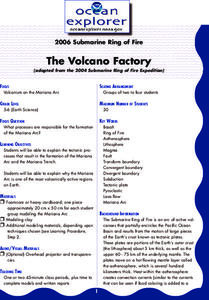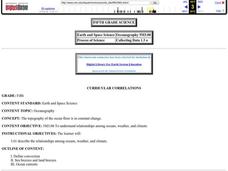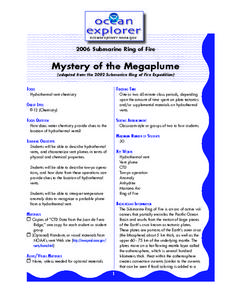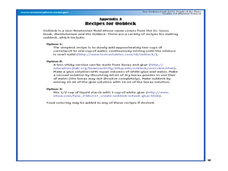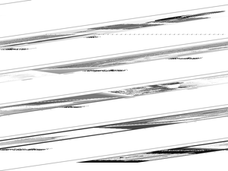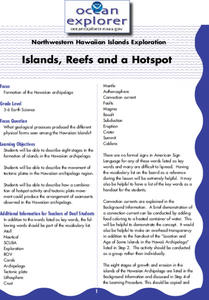Rice University
College Physics for AP® Courses
Take a look at an organized physics course. The 34-section electronic textbook covers material in AP® Physics 1 and 2. Teachers use the text to supplement lectures and have the class work through the labs. Each section contains...
Curated OER
Earth Science: The Structure of the Earth
Students identify and complete activities about the structure of the Earth. In this Earth structure lesson, students view a Powerpoint about the Earth's layers and complete a diagram. students compare temperatures in the Earth's layers...
Curated OER
Heating the Atmosphere
Students construct a thermograph for maximum and minimum temperatures for the 2-week period. They illustrate how the earth's atmosphere is heated by convection and conduction currents and evaporation of water.
Curated OER
Where Did They Come From?
Give science learners nine questions about the biogeography of hydrothermal vents and turn them loose to research this fascinating habitat. Working in cooperative groups, they prepare a report that addresses each of the questions. A...
Ocean Explorer
The Volcano Factory
The tectonic processes that have resulted in the formation of the Marianas Arc, and the Marianas Trench are explored. Groups of pupils access websites that give them a wealth of information about these formations. Each group must prepare...
NOAA
Where There's Smoke, There's ...
A remotely operated vehicle approaching a volcano was engulfed by molten sulfur where the plumes of fluids contained the highest concentrations of aluminum ever recorded. This isn't science fiction or an April fools joke, though it did...
Curated OER
Hurricane Happenings
Fourth and fifth graders engage in this impressive lesson which focuses on the causes of hurricanes and tropical storms. The use of video clips and Internet sites helps facilitate discussion amongst pupils which should lead them to a...
Curated OER
Curricular Correlations
Here is a terrific way to teach your oceanographers about the effects that the ocean have on the weather and climate found throughout the world. In it, pupils engage in a science experiment designed to emulate how the ocean affects...
Curated OER
Mystery of the Megaplume
Read through the extensive background information and then lead your geology or physical oceanography class through an investigation of actual temperature anomaly data from the Juan de Fuca ridge. They translate the data onto a plot,...
Curated OER
Friendly Volcanoes
Students discuss the benefits of volcanic activity on marine life. They explain the process of tectonic plates.
Curated OER
Plate Tectonics
Students participate in a series of experiments to learn about plate tectonics and the different materials of the Earth. In this plate tectonics lesson plan, students use eggs, water, beakers, paper, and more materials to learn about the...
Curated OER
Puzzle of the Plates
Students research tectonic plates and their movement. In this plate lesson plan, students describe the motion of these plates and the boundaries between them. They look into the San Andreas Fault and explore the earthquakes associated to...
Curated OER
When Plates Collide
Students investigate tectonic plates. In this geology and geography lesson, students construct convergent, divergent, and transform boundaries using oobleck, foam, and tile. A large amount of background information and relevant...
Curated OER
the biggest Plates on Earth
Students understand the movement of tectonic plates. In this tectonic plates lesson plan, students access prior knowledge of convergent, divergent, and transform boundaries. Students discuss energy transfer involved in plate...
Curated OER
Islands, Reefs, and a Hotspot
Students describe eight stages in the formation of islands in the Hawaiian archipelago. They examine the movement of tectonic plates in the Hawaiian archipelago region, and describe how plate movement produced the Hawaiian archipelago.
Curated OER
Seafloor Block Model
Students construct a 3-D block model of the ocean floor to study fundamental earth processes. This is a preconstructed cut out that allows the students to put it together but then to add their own colors as well. There is an evaluation...
Curated OER
My Friend, The Volcano
Students describe the positive impacts of volcanic activity on marine ecosystems. In this volcano lesson students explore the process that causes volcanic activity along the Mariana and Kermadec Island Arcs.
Curated OER
Plate Tectonics
Students watch a video about plate tectonics. in this Earth Science lesson, students watch a video clip from Bill Nye about Continental Drift and Plate Tectonics. They make a slight crack in a hard boiled egg and manipulate the egg to...
Curated OER
It Looks Like Champagne
Students determine some practical implications of the discovery of liquid carbon dioxide in deep-ocean ecosystems. They interpret phase diagrams and explain the meaning of "critical point" and "triple point."
Curated OER
Demonstration of Factors Affecting Soil Temperature
Students examine the influences of water and mulch on soil temperature. In this investigative activity students complete a soil experiment.
University Corporation for Atmospheric Research
Ucar: Web Weather for Kids: Thunderstorms & Tornadoes Make Convection Currents
Demonstrate convection currents using a clear box, red food coloring, ice cubes, colored pencils and index cards. Get all the directions you need for this simple lab.
PBS
Pbs Kids: Colored Water Convection
This PBS site allows users to learn more about water convection as they discover how to demonstrate the way convection currents form. A fun science project!
Exploratorium
Exploratorium: Science Snacks: Pie Pan Convection
In this experiment, students observe what happens when a pan of soapy, colored water is heated. They will see that convection currents cause the fluid to rise and sink in a localized convection cell.
Science Education Resource Center at Carleton College
Serc: Mn Step: What Makes Thunderstorms? See Convection
Using water, food coloring, and an ice cube, students observe the movement of convection currents in a container, and illustrate what they see happening. This activity develops their understanding of how thunderstorms form.




